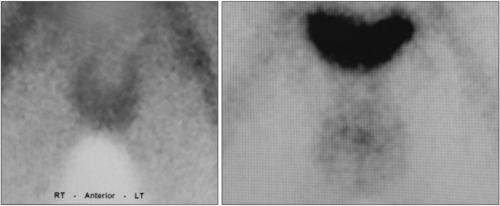Search
- Page Path
- HOME > Search
Case Reports
- A Case Report of Self-Inflicted Surgical Castration
- Koo Han Yoo, Sung-Goo Chang
- Urogenit Tract Infect 2023;18(3):107-109. Published online December 31, 2023
- DOI: https://doi.org/10.14777/uti.2023.18.3.107

-
 Abstract
Abstract
 PDF
PDF PubReader
PubReader ePub
ePub - Religious beliefs are a very significant part of one’s life. We report the case of a strongly religious man who sought to remove his testicles. After enlisting in the military, the man had a surgical castration performed on him while on vacation from military service. The procedure aimed to rid the man of his libido, which he saw as a hindrance to his religious life. After the removal of the testes, his serum testosterone was 0.25 ng/ml. The luteinizing hormone, 22.1 (1.7-8.6 mIU/ml), and follicle stimulating hormone, 53.5 (1.5-12.4 mIU/ml) were elevated. Testicular scans showed an absence of both testes. This appears to be an unfortunate situation caused by false religious beliefs and the reckless use of internet resources.
- 7,788 View
- 24 Download

- Xanthogranulomatous Epididymitis Unresponsive to Antibiotic Treatment
- Yeasol Kwon, Jun Baek Park, Sang Hwa Lee, Seung Ki Min
- Urogenit Tract Infect 2023;18(2):70-73. Published online August 31, 2023
- DOI: https://doi.org/10.14777/uti.2023.18.2.70
-
 Abstract
Abstract
 PDF
PDF PubReader
PubReader ePub
ePub - Xanthogranulomatous epididymitis is very rare, and there are few case reports worldwide. Clinically, it is necessary to differentiate between chronic scrotal inflammatory diseases, such as tuberculous epididymitis and testicular tumors. Proteus and Escherichia coli are the pathogens that generally cause xanthogranulomatous pyelonephritis, but the pathogens of xanthogranulomatous epididymitis are unclear. This paper reports a case of a 66-year-old male with epididymitis on scrotal ultrasonography and had Pseudomonas aeruginosa detected in a culture test. An orchiectomy was performed because he did not respond to antibiotic treatment.
- 2,745 View
- 17 Download


 KAUTII
KAUTII
 First
First Prev
Prev


